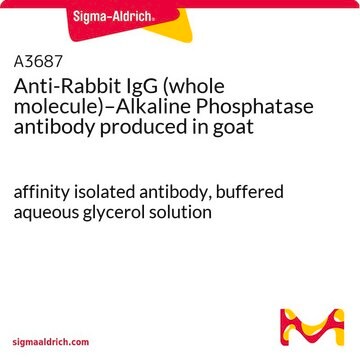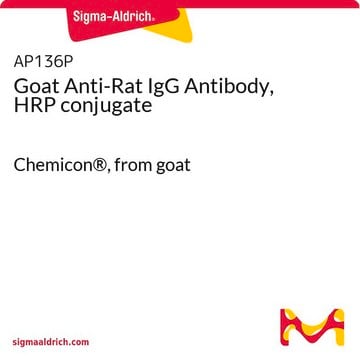MAB8744
Anti-St. Louis Encephalitis Antibody, MSI-7, clone 6B6C-1
clone 6b6c-1, Chemicon®, from mouse
Sinónimos:
SLE
Iniciar sesiónpara Ver la Fijación de precios por contrato y de la organización
About This Item
UNSPSC Code:
12352203
eCl@ss:
32160702
NACRES:
NA.41
Productos recomendados
biological source
mouse
Quality Level
antibody form
purified immunoglobulin
clone
6b6c-1, monoclonal
species reactivity
human
manufacturer/tradename
Chemicon®
technique(s)
ELISA: suitable
immunofluorescence: suitable
inhibition assay: suitable (hemagglutination)
isotype
IgG2a
shipped in
wet ice
Specificity
Cross reactivity to St. Louis encephalitis (MSI-7), Japanese encephalitis (Nakayama), West Nile (EG 101), Murray Valley encephalitis (Original), Yellow fever (17D), Dengue 1 (Hawaii) Dengue 2 (New Guinea C), Dengue 3 (H87) and Dengue 4 (H241) is determined by ELISA.
Immunogen
Epitope: MSI-7
Application
Anti-St. Louis Encephalitis Antibody, MSI-7, clone 6B6C-1 detects level of St. Louis Encephalitis & has been published & validated for use in ELISA, HI & IF.
ELISA
Indirect immunofluorescence Hemagglutination inhibition
Optimal working dilutions must be determined by end user.
Indirect immunofluorescence Hemagglutination inhibition
Optimal working dilutions must be determined by end user.
Research Category
Infectious Diseases
Infectious Diseases
Research Sub Category
Infectious Diseases - Viral
Infectious Diseases - Viral
Physical form
Format: Purified
Protein A Purified mouse immunoglobulin in 20 mM sodium phosphate, 250 mM NaCl, pH. 7.6, with 0.1% sodium azide as a preservative.
Protein A purified
Storage and Stability
Maintain for 1 year at 2–8°C from date of shipment. Aliquot to avoid repeated freezing and thawing. For maximum recovery of product, centrifuge the original vial after thawing and prior to removing the cap.
Analysis Note
Control
Patient culture
Patient culture
Other Notes
Concentration: Please refer to the Certificate of Analysis for the lot-specific concentration.
Legal Information
CHEMICON is a registered trademark of Merck KGaA, Darmstadt, Germany
Disclaimer
Unless otherwise stated in our catalog or other company documentation accompanying the product(s), our products are intended for research use only and are not to be used for any other purpose, which includes but is not limited to, unauthorized commercial uses, in vitro diagnostic uses, ex vivo or in vivo therapeutic uses or any type of consumption or application to humans or animals.
Storage Class
10 - Combustible liquids
wgk_germany
WGK 2
flash_point_f
Not applicable
flash_point_c
Not applicable
Certificados de análisis (COA)
Busque Certificados de análisis (COA) introduciendo el número de lote del producto. Los números de lote se encuentran en la etiqueta del producto después de las palabras «Lot» o «Batch»
¿Ya tiene este producto?
Encuentre la documentación para los productos que ha comprado recientemente en la Biblioteca de documentos.
Elucidation of the topography and determination of the protective epitopes on the E glycoprotein of Saint Louis encephalitis virus by passive transfer with monoclonal antibodies.
Mathews, J H and Roehrig, J T
Journal of immunology (Baltimore, Md. : 1950), 132, 1533-1537 (1984)
J T Roehrig et al.
Journal of clinical microbiology, 35(7), 1887-1890 (1997-07-01)
We used previously characterized murine monoclonal antibodies to develop a panel useful in subtyping Venezuelan equine encephalitis (VEE) viruses by an indirect fluorescent antibody assay. This panel worked well with either prototype VEE viruses or a series of more recent
Exclusion of West Nile virus superinfection through RNA replication.
Zou, G; Zhang, B; Lim, PY; Yuan, Z; Bernard, KA; Shi, PY
Journal of virology null
Jaime E Castellanos et al.
Biomedica : revista del Instituto Nacional de Salud, 36(0), 156-158 (2016-09-14)
Dengue is a human disease caused by a virus with the same name, which is transmitted by the bite of Aedes mosquitoes. The infection has a wide range of clinical presentations ranging from asymptomatic to fatal cases, with the pediatric
Erik Hofmeister et al.
Journal of wildlife diseases, 51(2), 411-418 (2015-01-15)
Detection of West Nile virus (WNV) has been reported in a variety of wild ducks in the US, but little is known about the pathogenesis and outcome of exposure of the disease in these species. Previous experimental studies of WNV
Nuestro equipo de científicos tiene experiencia en todas las áreas de investigación: Ciencias de la vida, Ciencia de los materiales, Síntesis química, Cromatografía, Analítica y muchas otras.
Póngase en contacto con el Servicio técnico






